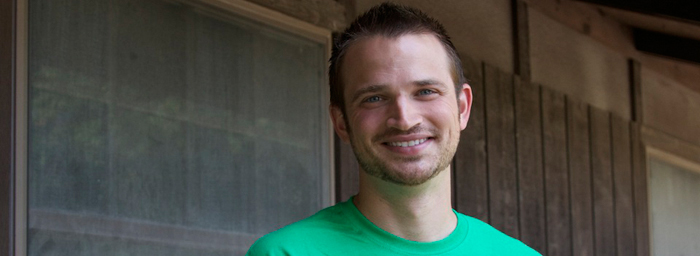WHY CHURCH CAMP IS A HARDER SELL THAN EVER (AND WHAT YOU CAN DO ABOUT IT)

Written by Aaron Helman
I love Church Camp.
I’ve worked as staff at Church Camp, directed a Church Camp, spoken at Church Camp, and I’ve sent students to Church Camp for the past fifteen years.
Done well, I see as much spiritual growth in a single week of Church Camp as I do in weeks and months of youth group programming.
But despite all of that, we are continuing to send fewer and fewer students to Church Camp, even as our ministry is growing. I’m not alone. Most youth workers report that it’s harder than ever to get kids to camp, and they’re looking for answers.
We’ll get to those in a minute, but first let’s talk about why the problem exists in the first place.
The summer camp market is more crowded.
As few as twenty years ago, parents didn’t have a lot of options when it came to summer camping programs. There was Church Camp. Or there was Scout Camp. And that was about it.
Today, those two options still exist; but parents can also choose between Art Camps, Music Camps, STEM Camps, or Camps for Every Sport Under the Sun. These camps typically carry heftier marketing budgets than your local Church Camp, and so they’re able to sell themselves as more fun and appealing to your students.
The summer has gotten shorter.
As more and more schools move toward balanced calendars, and as the required load of extracurricular activities continues to swell, families have less and less free time in the summer.
As one mom pointed out to me, between the end of the school baseball season (which, in Indiana, can run 2-3 weeks beyond the end of the school year) and the beginning of band camp, her family had four total weeks of summer.
Church Camp prices have skyrocketed.
In order to compete in the crowded summer camp sector, many Church Camps have invested heavily in their facilities and activities to make themselves more appealing to teenagers. But that stuff isn’t free, and as any economist can tell you, the number of consumers willing to pay will always fall when prices rise.
Weekly youth group programs are higher-quality than ever before.
Twenty years ago, most youth groups didn’t feature a full band, funny videos, and charasmatic speaking accompanied by state-of-the-art tech. That made camp a novelty. You got to worship at camp in a way you didn’t get to worship back home.
In many places, it’s not that way anymore. At the last camp I directed, I was the speaker and our youth band was the praise team. Our kids still had a blast at camp, but it does lose some of the luster when the music and the teaching is exactly the same as it was at church last Sunday.
So, should we give up on Church Camp?
Absolutely not. Church camp is still as valuable a place for spiritual growth as it always has been. You should support and promote your camps. You should help parents understand the tremendous spiritual value that their kids get at Church Camp… that they can’t get at any of those other places. You should fundraise and provide scholarships to remove financial barriers for families. You should do all of these things.
But, you shouldn’t put all of your eggs in the Church Camp basket. Not anymore.
It’s easy to find ourselves asking the question, “What can I do to get all of my students to attend Church Camp?”
It’s the wrong question.
In the face of rising prices, busy schedule, and crowded markets; there is nothing you can do to get all of your students to attend Church Camp. There will always be those who cannot or will not attend.
So instead, let’s ask a different question: “How can I minister to students who don’t attend Church Camp?”
That’s a tougher question, and it comes with a lot of different answers. It might mean a three-day Day Camp experience you host in your own community. It might mean going deeper this summer than Beach Trips and Frisbee Days. It might mean one-on-one mentoring and a lot of Frappuccinos and deep conversations about life and God.
It’s going to be different for you and your ministry, but it’s an important mental shift to be able to make. Church Camp is good and great and awesome, but just because a student misses it doesn’t mean you can’t make an impact on their spiritual life.

Written by Aaron Helman. Aaron has been in youth ministry for over 15 years and is currently a youth pastor in South Bend, Indiana.

5 Replies to “WHY CHURCH CAMP IS A HARDER SELL THAN EVER (AND WHAT YOU CAN DO ABOUT IT)”
Mark Warran
My wife and I are Pastor’s as well as State Youth Directors for our organization. We have seen a slip in attendance for our Youth Interns over time. They are a very highly knit Team of young people that help out in our Kid’s Camp. As they move on and “Age Out” it becomes harder to fill the position they fulfilled for years. But the Kids that are coming up behind them are going to be a phenomenal tool to reach others for God. They are already in the altars seeking God. I understand what you are saying and it is a great concern. There is hope in Jesus. I appreciate you and your insite. Thank you so much for dealing with the hard to tackle subjects. God Bless you.
Kristy Preston
Thanks so much Mark!
Phil Winder
One big ingredient that seems to be missing today is Godliness. In years gone by Godly parents insisted that their kids summer itinerary involved summer camp. As Godliness now seems to have taken a back seat in most homes camp falls by the wayside. This is proven by church attendance. To most families church attendance is optional so the things of God become optional.
Kristy Preston
Phil, We appreciate your view and we are praying that families start to realize that God should be #1.
Kelly Raaum
I completely agree with your assessment, Aaron. We’ve seen this trend over the course of the last 10 years. There is a piece of education that we have to do with the general congregation to this fact. Many long-time members look at dipping numbers as a negative sign on the youth ministry. We continue to share these points with them. There is great stuff happening in the youth program, not just at camp! And we (Sundays and other days) are constantly competing with these other outside programs and events. We’re not the only game in town anymore. So the challenge is to meet the students where they are TODAY, not yesterday.